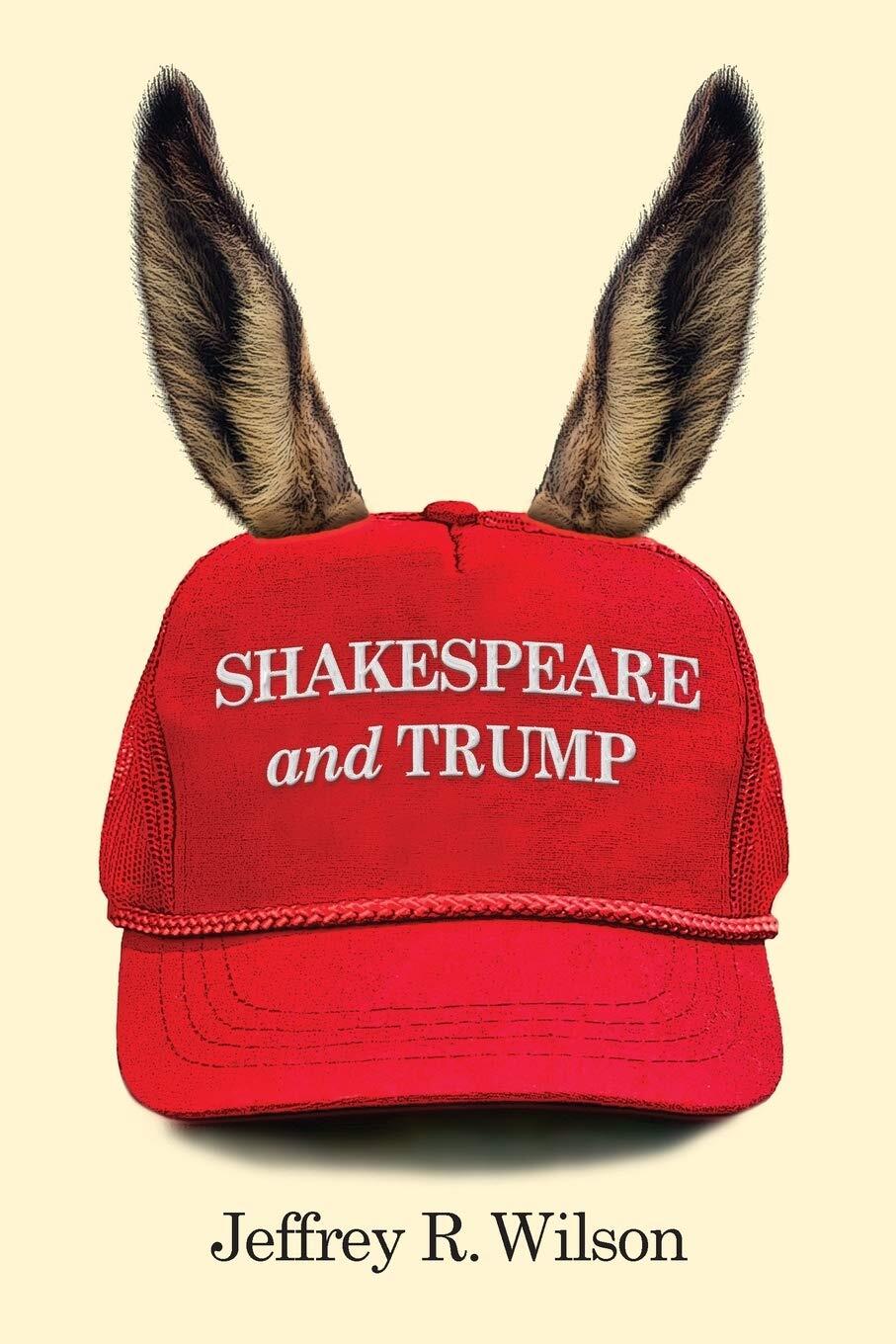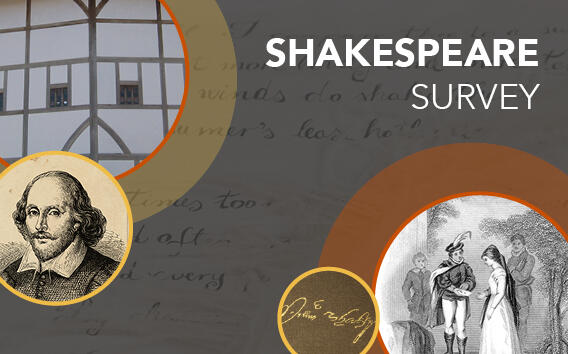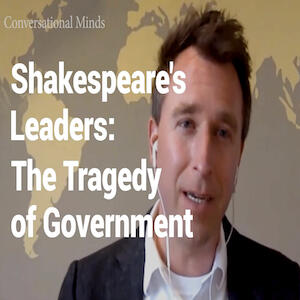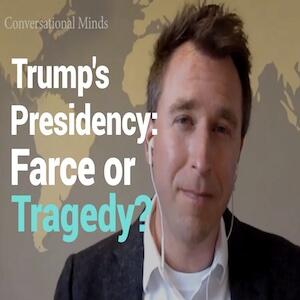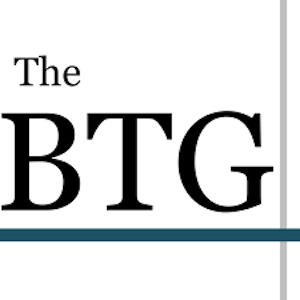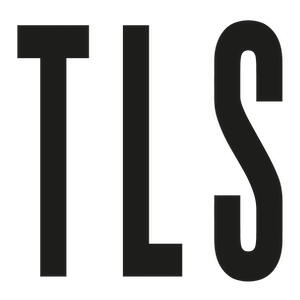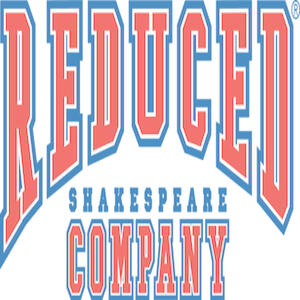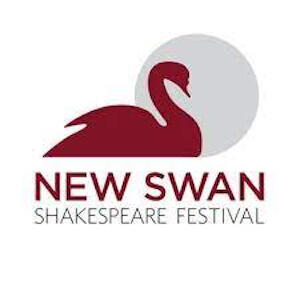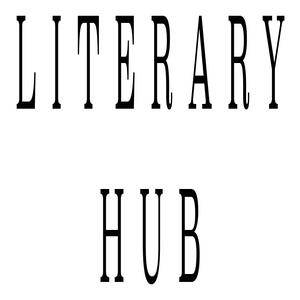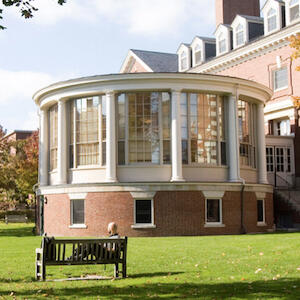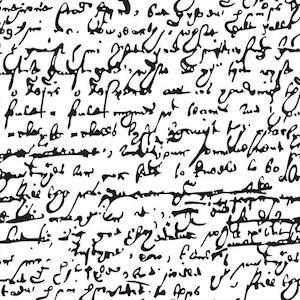The Really Bad Quartos: Similar to the Shakes-Trump Travesties, satirical creative writing that tells Shakespearean stories in Trumpian language or vice versa.
Aryeh Cohen-Wade, “Donald Trump Performs Shakespeare’s Soliloquies,” The New Yorker (April 6, 2016).
Jaime Fuller, “Shakespeare’s Latest Tragedy: The 2016 Election,” Mtv.com (April 25, 2016).
T. Campbell, “Shakespeare’s Trump I, Act I, Scene I,” Medium (Feb 12, 2017).
Nick Shea, Donald Trump vs. William Shakespeare: A Battle of Wits (2018).
Charlie Ovink, “Shakespeare Edited for the Trump Era,” McSweeneys (Feb. 28, 2017).
Jim Marino (Doctor Cleveland), “I am Part of the Resistance Inside King Lear’s Court,” Dag Blog (Sept. 5, 2018).
Tom McBride, The Donald & The Bard: Shakespeare Goes On Cable News (CreateSpace Independent Publishing, 2018).
Robert Hornback, The Trump Lexicon (Nonesuch, 2018).
Ian Doescher and Jacopo della Quercia, MacTrump (Philadelphia: Quirk, 2019).
AJ Smith, By the Thumbings of a Prick: The Tweets of Donald Trump as Shakespearean Sonnets (Somerville, NJ: This is Livin’, 2019).
Martin Rowson, "Shakespearean Tragedy," Culture Matters (Nov. 17, 2020).
Scholarly Conference Papers and Journal Articles at the Intersection of Shakespeare and Trump: Which Always Have Colons in Their Titles: Talks by academics for academics, usually leveraging a specialist’s historical knowledge to unfurl a new wrinkle in the Shakespeare-and-Trump discourse.
Cass Morris, “‘To try eloquence, now ‘tis time’: Virtues and Vices of Rhetoric,” American Shakespeare Center (Jan. 17, 2017).
Christina Dennehy, “‘I Find the People Strangely Fascinated’: Performing King John in the Trump Era,” Blackfriars’s Conference (Staunton, VA: American Shakespeare Center, Oct. 2017).
Gabriel Rieger, “‘Indeed, it is a strange-disposed time’: Julius Caesar, A Game at Chess, and the Politics of Staging,” Ohio Valley Shakespeare Conference (Berea, OH: Baldwin Wallace University, Oct. 2017); Selected Papers of the Ohio Valley Shakespeare Conference 10 (2019): 53-63.
Anne-Marie Walkowicz, “Shakespeare’s Oppositional Voices: Politics, Power, and Citizenship in Julius Caesar Both Then and Now,” Ohio Valley Shakespeare Conference (Berea, OH: Baldwin Wallace University, Oct. 2017).
Kathryn T. Burt, “‘When Caesar says ‘Do this,’ it is perform’d’: Political Metadrama in Shakespeare’s Julius Caesar and Donald Trump’s Presidential Campaign,” oral presentation (Rock Hill, SC: Winthrop University, 2018).
Susan Rowland, “The Demonic and Narcissistic Power of the Media in Shakespeare's Macbeth,” in A Clear and Present Danger: Narcissim in the Era of President Trump, ed. Leonard Cruz and Steven Buser (Asheville: Chiron, 2017): 229-40.
Ronnie Mulryne, “King Lear: Perception and the Price of Silence,” Modern Believing 58.2 (2017): 111-22.
Ameer Sohrawardy, “Julius Caesar and the 2016 Presidential Election,” English Journal 107.4 (2018): 64-66.
Yo Jin Ko, “Donald Trump: Shakespeare’s Lord of Misrule,” in Trump and Political Philosophy: Leadership, Statesmanship, and Tyranny, ed. Angel Jaramillo Torres and Marc Benjamin Sable (New York, NY: Palgrave Macmillan, 2018): 149-62.
Paul Hamilton, “Trump, Macbeth, and Complicity in the State of Emergency,” British Shakespeare Association Annual Convention (Belfast, Northern Ireland: Queens University Belfast, June 2018).
David Ruiter, “Shakespeare and Theatre at the Civic Intersection,” New Places: Shakespeare and Civic Creativity, ed. Paul Edmondson and Ewan Fernie (London: Bloomsbury, 2018): 235-49.
Dan Venning, “Richard III in the Era of Trump,” PAJ: A Journal of Performance and Art 40.2 (2018): 1-12.
Stephen Purcell, “Shakespeare Performances in England, 2017,” Shakespeare Survey 71 (2018): 305-43.
Daniel Spector, “Shakespeare Studies and Performance: Free Speech and Identity Politics,” British Shakespeare Association Annual Convention (Belfast, Northern Ireland: Queens University Belfast, June 2018).
Molly Beth Seremet, “‘This is and is Not Cressida’: Resisting Anthropocentrism in a Shakespeare of Things,” Early Modern Culture 13 (2018): 138-48.
Jeffrey Jerome Cohen, “Response: In the Storm,” Early Modern Culture 13 (2018): 149-51.
Courtney Lehmann, “The Trump Effect: Exceptionalism, Global Capitalism, and the War on Women in Early Twenty-first-century Films of King Lear,” in Shakespeare on Screen: King Lear, ed. Victoria Bladen, Sarah Hatchuel, and Nathalie Vienne-Guerrin (Cambridge: Cambridge University Press, 2019): 171-84.
Public Shakespeare: Essays by Shakespeare scholars for public venues bringing the plays into discussion with current events.
Andrew Cutrofello, “Shakespeare and Trump: What’s in a Name?” Public Seminar (December 15, 2015).
Gary Schmidgall, “What Would Shakespeare Make of Trump?” The Chronicle Review (Feb. 7, 2016).
Brian Leiter, “Shakespeare on Trump: Money Made the Man,” The Huffington Post (Feb 29, 2016).
Charles McNulty, “The Theater of Trump: What Shakespeare can teach us about the Donald,” Los Angeles Times (May 26, 2016).
Paul Hamilton, “Trumping Shakespeare: Donald Trump, Boris Johnson, and the Rise of the Clown Politician,” Kingston Shakespeare Seminar (July 11, 2016).
Peter C. Herman, “Shakespeare’s ‘Macbeth,’ Donald Trump, and the Republican Party,” Times of San Diego (Aug. 7, 2016).
Stephen Greenblatt, “Shakespeare Explains the 2016 Election,” New York Times Sunday Review (Oct. 8, 2016).
Sean Keilen, “Anger in Politics: From Shakespeare to Donald Trump,” UCSC Institute for Humanities Research (Santa Cruz, CA: Kuumbwa Jazz Center, Oct. 18, 2016). See Scott Rappaport, “Anger in Politics: From Shakespeare to Donald Trump,” UC Santa Cruz News Center (Sept. 22, 2016).
Noah Millman, “The Age of Trump, as Explained by Shakespeare,” The Week (Nov. 2, 2016).
Eric Minton, “Locker Room Talk and Sexual Assault: To Whom Should I Complain?” Shakespeareances (Nov. 6, 2016).
Rex Weiner, “Titus in Space,” The Paris Review (Nov. 29, 2016).
Steve Mentz, “He Must See Ghosts: Richard III, Trump, and the Future,” Hypocrite Reader 70 (Dec. 2016).
Michael Billington, “Forget Julius Caesar – Trump is more like Richard III, Shakespeare’s satanic joker,” The Guardian (June 12, 2017).
Ross Douthat, “The Trumpiest Roman of Them All,” New York Times (June 14, 2017).
Daniel Pollack-Pelzner, “Behold, Steve Bannon’s Hip Hop Shakespeare Rewrite,” New York Times (Dec. 17, 2016).
Peter Conrad, Shakespeare: The Theatre of Our World (Head of Zeus, 2018), excerpted in “Shakespeare in the Age of Brexit and Trump: The Play’s Still the Thing,” The Observer (Sept. 29, 2018).
“Q&A: A Tale Told by an Idiot: Shakespeare and Trump,” Prospect (Feb. 6, 2017).
Rhodri Lewis, “Shakespeare and the American Oligarchy,” Times Literary Supplement (Jan. 23, 2017).
Gavin Paul, “Reading King Lear in the Age of Trump,” Medium (June 16, 2017).
Robert Cooper, “Shakespeare’s Politics,” The American Interest 13.1 (June 20, 2017).
Michael Hiltzik, “No mercy in him: Reading Shakespeare's 'Coriolanus' in the age of Trump,” Los Angeles Times (Aug. 23, 2017).
Paula Marantz, “The Bard Can Help Us Understand Politics’ Sound and Fury,” The Wall Street Journal(Sept. 8, 2017).
Ambereen Dadabhoy, “Why We Need a Trump Shakespeare,” What Can a Liberal Arts Education Offer in the Age of Trump (Claremont, CA: Harvey Mudd College, Sept. 26, 2017).
Stephen Greenblatt, Tyrant: Shakespeare on Politics (New York, NY: Norton, 2018).
William Germano, https://www.chronicle.com/blogs/linguafranca/2018/08/02/benedict-arnold-...
Eliot A. Cohen, “How This Will End,” The Atlantic (Aug. 24, 2018).
Peter C. Herman, “Shakespeare, Kavanaugh and an Ancient Theme of Sexual Hypocrisy,” Times of San Diego (Sept. 24, 2018).
Colin Dray, “Making Troy Great Again: On Shakespeare's 'Troilus and Cressida' and Trump's Ugly Political Rhetoric,” Pop Matters (Oct. 15, 2018).
Bret Stephens, “When Fiction Most Becomes Trump,” New York Times (Dec. 28, 2018).
Robin Bates, “Which Shakespeare Character is Trump?” Better Living Through Beowulf (Jan. 2, 2019).
Tom Rogan, “Shakespeare Twitter is Wrong: Trump isn't Macbeth and America isn't Sinking,” The Washington Examiner (Jan. 22, 2019).
Jennifer Finney Boylan, “The Madness of King Donald,” New York Times (Feb. 20, 2019).
Peter C. Herman, “Lessons from Shakespeare for the Trump White House,” Times of San Diego (March 2, 2019).
Kevin D. Williamson, “Springtime of Their Discontent,” National Review (March 26, 2019).
Daniel Pollack-Pelzner, “In “Gary: A Sequel to Titus Andronicus,” Taylor Mac Takes on Shakespeare—and Trump,” The New Yorker (April 20, 2019).
Gregg Opelka, “Would Shakespeare Impeach Trump?” Wall Street Journal (Sept. 27, 2019).
Stephen Marche, “The Shakespearean Tragedy that Resembles Trump’s Presidency Almost Too Well,” The World Post (Oct. 10, 2019).
Liesl Schillinger, “High Comedy and Misdemeanors: The Shakespearean Drama at the Heart of Impeachment,” Lit Hub (Dec. 17, 2019).
Kevin J. Wetmore Jr., “Dramatis Personae,” LMU Magazine (Dec. 17, 2019).
James Shapiro, Shakespeare in a Divided America (New York: Penguin, 2020).
James Shapiro, “Shakespeare and the Culture Wars: On the Movement for Color-Blind Casting,” Literary Hub (March 12, 2020).
James Shapiro, "The Shakespeare Play That Presaged the Trump Administration’s Response to the Coronavirus Pandemic,” The New Yorker (April 8, 2020).
Raouf Halaby, "Character Comparison: What Would Shakespeare, Creator of King Lear, Think of Donald Trump?" Northwest Arkansas Democrat Gazette (April 26, 2020).
Michael Judge, "Sound and Fury: Seeing the Trump-Biden Contest Through the Eyes of Macbeth," The Wire (July 20, 2020).
William E. Ellis, "Only Shakespeare could do justice to the last four years in Washington, D.C." Lexington Herald Leader (Dec. 23, 2020).